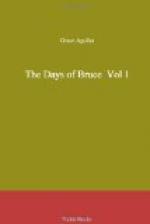All Scotland lay at the feet of his foe. John of Lorn, maternally related to the slain Red Comyn, had collected his forces to the number of a thousand, and effectually blockaded his progress through the district of Breadalbane, to which he had retreated from a superior body of English, driving him to a narrow pass in the mountains, where the Bruce’s cavalry had no power to be of service; and had it not been for the king’s extraordinary exertions in guarding the rear, and there checking the desperate fury of the assailants, and interrupting their headlong pursuit of the fugitives, by a strength, activity, and prudence, that in these days would seem incredible, the patriots must have been cut off to a man. Here it was that the family of Lorn obtained possession of that brooch of Bruce, which even to this day is preserved as a relic, and lauded as a triumph, proving how nearly their redoubted enemy had fallen into their hands. Similar struggles had marked his progress through the mountains ever since the defeat of Methven; but vain was every effort of his foes to obtain possession of his person, destroy his energy, and thus frustrate his purpose. Perth, Inverness, Argyle, and Aberdeen had alternately been the scene of his wanderings. The middle of autumn found him with about a hundred followers, amongst whom were the Countess of Buchan and her son, amid the mountains which divide Kincardine from the southwest boundary of Aberdeen. The remainder of his officers and men, divided into small bands, each with some of their female companions under their especial charge, were scattered over the different districts, as better adapted to concealment and rest.
It was that part of the year when day gives place to night so suddenly, that the sober calm of twilight even appears denied to us. The streams rushed by, turbid and swollen from the heavy autumnal rains. A rude wind had robbed most of the trees of their foliage; the sere and withered leaves, indeed, yet remained on the boughs, beautiful even in, their decay, but the slightest breath would carry them away from their resting-places, and the mountain passes were incumbered, and often slippery from the fallen leaves. The mountains looked frowning and bare, the pine and




